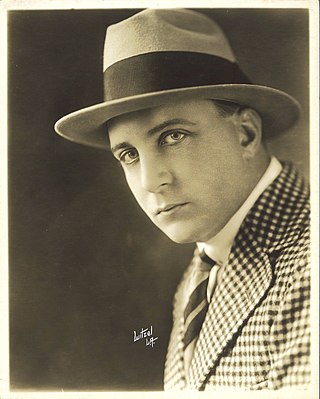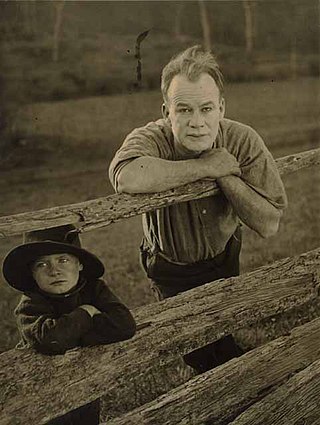Related Research Articles

Edwin James Brady was an Australian journalist and poet.

The Man from Snowy River is a 1920 film made in Australia. The film was silent and filmed in black and white, and was based on the Banjo Paterson poem of the same name. It is considered a lost film.

Arthur Shirley was an Australian actor, writer, producer, and director of theatre and film. He experienced some success as a film actor in Hollywood between 1914 and 1920.
Frank Beaumont "Beau" Smith, was an Australian film director, producer and exhibitor, best known for making low-budget comedies.

Joe is a 1924 Australian silent film comedy directed by Beaumont Smith based on the stories of Henry Lawson about the character Joe Wilson.
The Dinkum Bloke is a 1923 Australian silent film directed by Raymond Longford. Despite the title and the presence of Arthur Tauchert and Lottie Lyell in the cast, the film is not a direct sequel to The Sentimental Bloke (1919) or Ginger Mick (1920).
Australia Calls is a 1923 Australian silent film directed by Raymond Longford commissioned by the Australian government to be shown at the British Empire Exhibition in Wembley Park, London, in 1924.
Fisher's Ghost is a 1924 Australian silent film directed by Raymond Longford based on the legend of Fisher's Ghost. It is considered a lost film.

The Shadow of Lightning Ridge is a 1920 Australian silent film starring renowned Australian sportsman Snowy Baker. It has been called the most "Western"-like of the films Baker made in Australia.
Tall Timber is a 1926 Australian silent film about a rich man who flees the city and works in a timber mill. It is considered a lost film.
A Daughter of Australia is a 1922 Australian silent film directed by Lawson Harris. It concerns a rich squatter, Arthur Fullerton, and his daughter, Barbara.
William Lawson Harris was an American director, actor, producer, and writer who made a number of films in Australia. He came to Australia originally at the behest of Arthur Shirley to work as production manager on The Throwback (1920) and stayed out there for a number of years. Harris was the father of actor and director John Derek.
Sunshine Sally is a 1922 Australian silent film directed by Lawson Harris set in the Sydney suburb of Woolloomooloo. Most of the movie survives today.
Law or Loyalty is a 1926 silent film directed by Lawson Harris. It was set in Canada.
The Guyra Ghost Mystery is a 1921 Australian film written and directed by John Cosgrove. It was based on the real-life 1921 mystery of the Guyra Ghost.
Ernest Henry Higgins was an Australian cinematographer during the days of silent film. He was the eldest brother of Arthur and Tasman Higgins. He shot the film The Throwback (1920) for director Arthur Shirley which resulted in Shirley unsuccessfully suing Higgins for breach of contract.
Jonas Alfred Lipman, frequently referred to as "Joe", was an Australian philanthropist, actor, producer and director of theatre and film. He was described as "a colourful extrovert" with "a flair for the wheeling and dealing of the film trade".

Yvonne Pavis was an English-born actress, writer, and producer. She began acting in Hollywood in 1910 with the Vitagraph Company, occasionally acting under the name Marie Pavis. In 1922, she went to Australia and formed a production company with Lawson Harris. After a brief time as The Yvonne Pavis Production Company, the company changed its name to Harris Austral Super Films and produced three features. She returned to the United States in 1924. She and Harris married, but divorced in 1925.

Will Lawson, born in Durham, England, was a popular bush poet, novelist, journalist and historian of Australia. Many of his works had sailing or stage coach themes.
J. C. Williamson's, formerly Williamson, Garner, & Musgrove and Williamson and Musgrove, was an Australian theatrical management company and theatre owner. With its beginnings in the theatrical productions of J. C. Williamson and his partners in the nineteenth and early twentieth century, the company J. C. Williamson Limited was established in 1910. Colloquially known as The Firm or JCW, the company dominated Australian commercial theatre in the twentieth century and at one time was described as the largest theatrical firm in the world. It closed under financial pressure in 1976.
References
- ↑ "AT THE APOLLO THEATRE". The Sun . No. 1001. New South Wales, Australia. 4 June 1922. p. 20. Retrieved 18 June 2018– via National Library of Australia.
- ↑ "HAYMARKET THEATRE". Truth . No. 1691. New South Wales, Australia. 4 June 1922. p. 2. Retrieved 18 June 2018– via National Library of Australia.
- 1 2 3 Andrew Pike and Ross Cooper, Australian Film 1900–1977: A Guide to Feature Film Production, Melbourne: Oxford University Press, 1998, 111-112.
- ↑ "Circumstance". Table Talk . No. [?]72. Victoria, Australia. 24 May 1923. p. 42. Retrieved 18 June 2018– via National Library of Australia.
- ↑ Everyones, Everyones Ltd, 1920, retrieved 18 June 2018
- ↑ "The PICTURE WORLD". Table Talk . No. 3166. Victoria, Australia. 10 January 1929. p. 27. Retrieved 18 June 2018– via National Library of Australia.
- ↑ Everyones, Everyones Ltd, 1920, retrieved 18 June 2018
- ↑ "MUSIC AND DRAMA". Truth . No. 1692. New South Wales, Australia. 11 June 1922. p. 2. Retrieved 18 June 2018– via National Library of Australia.
- ↑ Everyones, Everyones Ltd, 1920, retrieved 18 June 2018